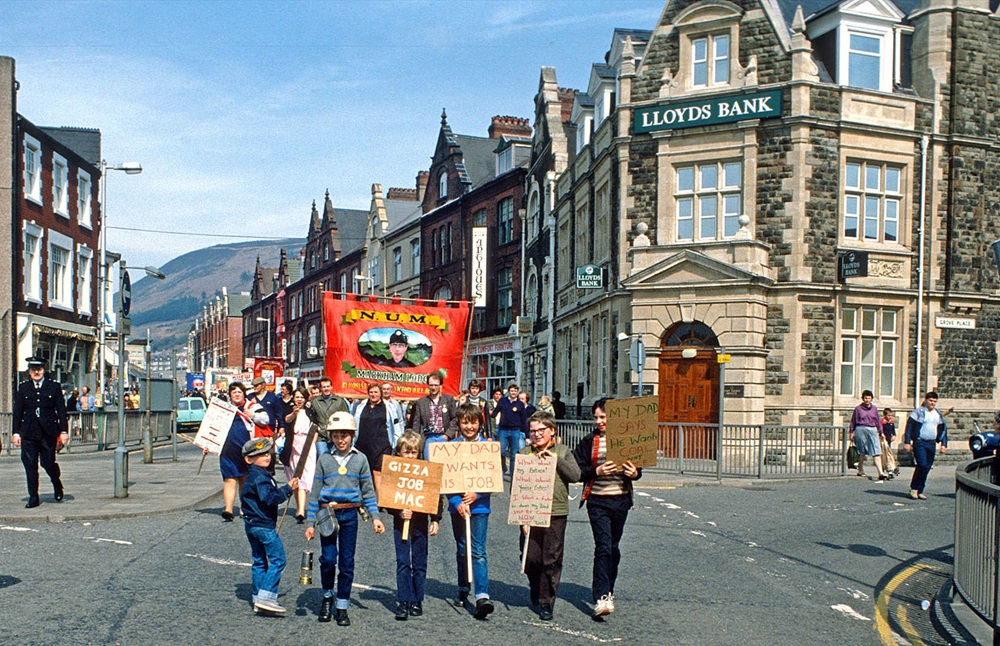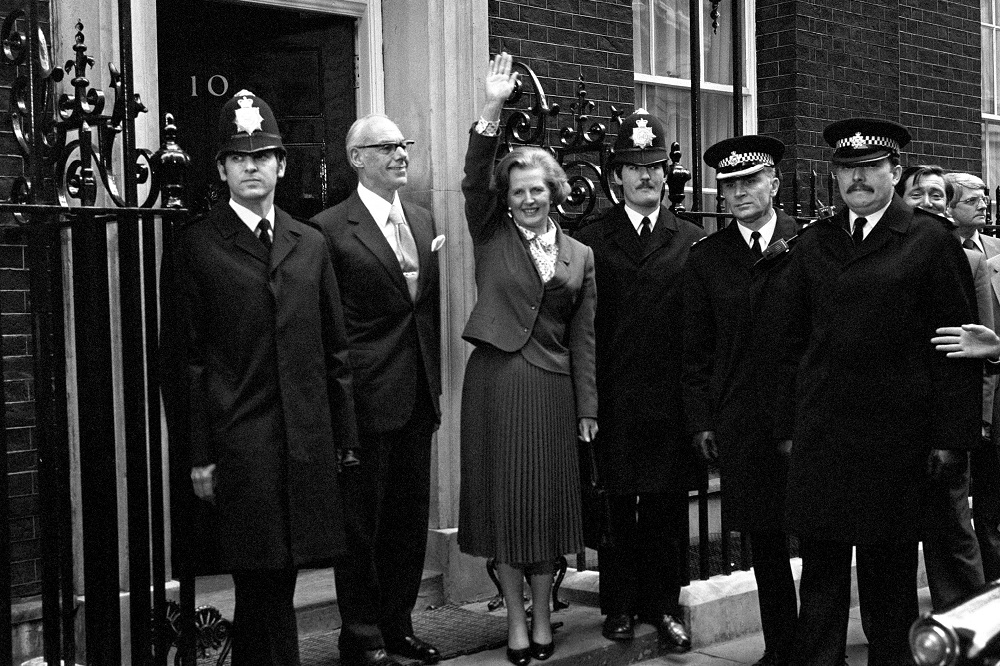How the 1984 miners’ strike paved the way for devolution in Wales

Mari Wiliam, Lecturer in Modern and Welsh History, Bangor University
Marc Collinson, Lecturer in Political History, Bangor University
March 2024 marks the 40th anniversary of the start of the miners’ strike. In Wales, particularly within the south Wales coalfield, it was more than an industrial dispute. This was a major political event that reflected deeper cultural and economic changes.
These changes, alongside discontent at the emphasis of the then-UK prime minister Margaret Thatcher’s Conservative government on free market economics, stifling trade unions and reducing the size of the state shifted how many Labour heartlands viewed the idea of self-government for Wales. This was due to Thatcher’s actions hitting at the heart of many working-class Labour voters’ existence, leading to threats to livelihoods and communities.
Many started feeling that some of the devastation wreaked by Thatcherism could have been avoided had there been a devolved Welsh government. That government would, in all likelihood, have been Labour controlled, acting as a “protective shield”.
Instead, by the time of the May 1979 general election (five years before the miners’ strike), Wales was a nation divided. Only weeks earlier, it had overwhelmingly rejected the Labour government’s proposal to create a Welsh Assembly, which would have given Wales a certain degree of autonomy from Westminster.
Many Labour MPs, such as Welshman Neil Kinnock, had vehemently opposed devolution and favoured a united British state. However, it was now this state, through a National Coal Board overseen by a Westminster Conservative government, that was aiming to further close Welsh coal mines.
The National Union of Mineworkers (NUM) was both a political and workplace representative for miners and their communities. For a politician like Kinnock, balancing party and local interests was difficult.
Thatcher’s Conservative party won a large majority at the 1983 election and the Ebbw Vale MP, Michael Foot, had been Labour leader during its defeat. His left-wing manifesto had been dubbed the “longest suicide note in history” by Gerald Kaufman, himself a Labour MP. It led to Foot’s resignation and the election of Kinnock as the leader of the opposition.
As a miners’ strike looked more likely, the national context made Labour party support for the strike problematic. Despite his political and personal ties to the NUM, Kinnock disagreed with its leaders, such as Arthur Scargill, and their strategies for the strike. However, the Labour leader supported the right of the miners to defend their livelihood.
In a period of difficult deindustrialisation across nationalised industries, Labour was caught between unstoppable economic restructuring and job losses that affected its traditional voters.
Thatcherism and Wales
Gwyn A. Williams, a Marxist historian, described Welsh people as “a naked people under an acid rain”. This acidity had two main ingredients: Thatcherism and the “no” vote for a Welsh Assembly in 1979.
According to this analysis, the absence of devolution in Wales had left it exposed to the vagaries of Conservative governance in Westminster. The dangers of this were illuminated during the miners’ strike and in high unemployment rates of nearly 14% in Wales by the mid-1980s.

However, it would be a fallacy to argue that Wales was a no-go zone for the Conservatives, even after the strike. In the 1987 general election, although their number of MPs dropped from the 1983 high of 14 to eight, they were still attracting 29.5% of the Welsh vote.
It would take several more years of Conservative policies such as the poll tax, the tenure of John Redwood as secretary of state for Wales (1993-95) and the scandal-riven sagas of the party during the 1990s for them to gain zero seats in Wales in 1997.
Nonetheless, the strike, and the febrile atmosphere of the period, had carved out a Welsh distinctiveness to anti-Conservative rhetoric. Several organisations and conferences during the 1980s laid the groundwork that shaped new questions about Welsh nationhood. They contributed to the swing towards a narrow “yes” vote in the 1997 Welsh devolution referendum offered by Tony Blair’s Labour government, which came to power in 1997.
In February 1985, Hywel Francis, a historian and later Labour MP for Aberafan, published an article in the magazine, Marxism Today, suggesting that the miners’ strike was not merely an industrial dispute but an anti-Thatcher resistance movement.
Central to his argument was the formation of the Wales Congress in Support of Mining Communities the previous autumn, which formalised some of the “unexpected alliances” heralded by the strike. The Congress coordinated the demonstrations and activism of some of the diverse groups that both supported the miners and simultaneously resisted many of the policies of the Thatcher government. These included trade unionists, religious leaders, the women’s peace movement, gay rights campaigners, as well as Labour members and Welsh nationalist activists. According to Francis, the latter two realised that “unless they joined, the world would pass them by”.
The congress aimed to stimulate a coordinated debate about Welsh mining communities, moving the narrative away from picket-line conflict and towards a democratic vision of Wales’s future.
While the strike ended only a month after Francis’s article, and the organisation itself dissolved in 1986, the congress had bridged many chasms in Welsh society. It showed old enemies in Labour and Plaid Cymru that solidarity could reap more benefits than the overt tribalism that had blighted the devolution campaign of the 1970s.
Legacy
In 1988, the campaign for a Welsh Assembly was established in Cardiff by Siân Caiach of Plaid Cymru and Jon Owen Jones of Labour. It was a direct descendant of this collaborative ethos, feeding an altogether more mature debate around Welsh devolution than had been seen in the 1970s.
For example, Ron Davies, an arch-devolutionist in 1990s Labour, had voted “no” in 1979. This was predominantly because he saw devolution as a Trojan horse for Plaid.
However, seeing the consequences of the miners’ strike and Thatcherism on his constituency of Caerffili drove him towards a drastic re-evaluation of devolution as being a protective buffer for the people of Wales. He became leader of Welsh Labour in 1998, eventually joining Plaid in 2010.
Historian Martin Johnes has described Thatcher as an “unlikely architect of Welsh devolution”. Indeed, her inadvertent help in orchestrating the Welsh Assembly rested in the forging of Labour and Plaid Cymru cooperation, with the miners’ strike as a watershed movement.
The strike remains a vivid memory in many Welsh communities. It stands as a reminder to 21st-century politicians that today’s Senedd (Welsh parliament) was built on cross-party cooperation.
This article was first published on The Conversation
![]()
Support our Nation today
For the price of a cup of coffee a month you can help us create an independent, not-for-profit, national news service for the people of Wales, by the people of Wales.






Excellent article. Mildly progressive though devolution has been, it is simply not enough to save Cymru from chaotic and incompetent Westminster rule, the Groucho Marx economics (cf Professor Richard Murphy) of the Bank of England and the Treasury (with me-too Reeves to come), the mendacity of the Barnet Formula and funding for HS2, the Crown Estate, the bullying and bickering which is commonplace between London and Cardiff, the pettiness and arbitrariness of the current devolution ‘settlement’, and a legacy of exploitation of our land, our resources and our people. Welcome the nuclear obscenity? Welcome the pylons? Independence means saying NO… Read more »
The sad fact is . The likes of treacherous Neil Kinnock led those striking miners like lambs to the slaughter aloft his soapbox. He and others were responsible for stopping Welsh devolution in 1979 only for Labour to be kicked out of office leading to 18 destructive years of Conservative misrule that aiding not only the selloff of publicly owned utilities but facilitated the decimation and demise of those very same coalfield communities that even today have never recovered. Oh but Neil Kinnock and family did alright out of strangling the very idea of Welsh devolution, didn’t they. He and… Read more »